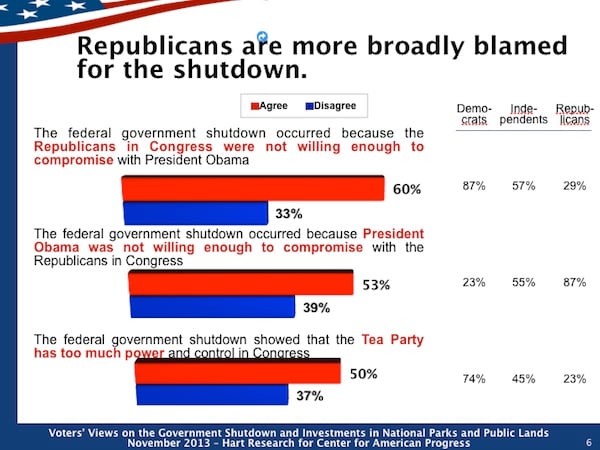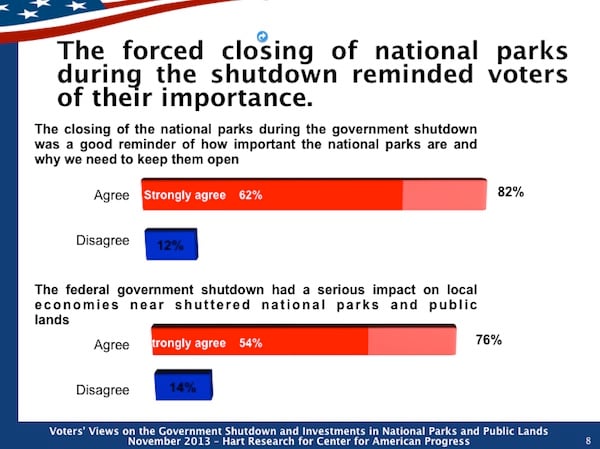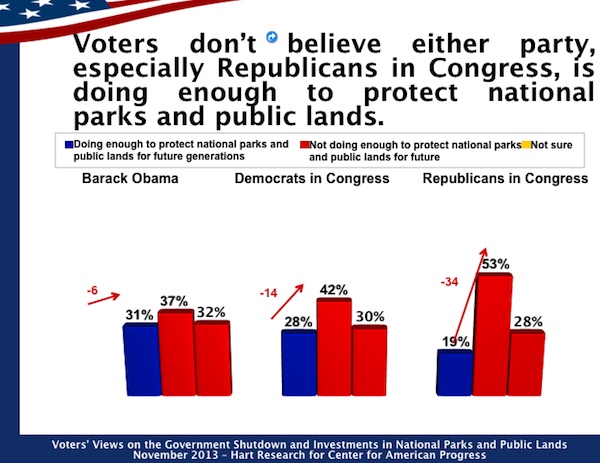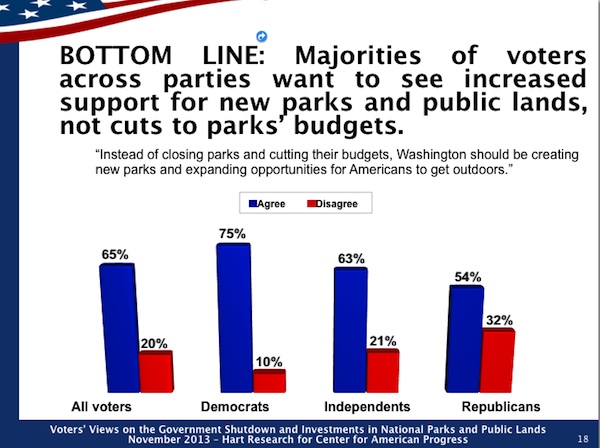Congress, not the Obama Administration, must shoulder the blame for the 16-day closure of the National Park System last month, according to a recent survey of voters.
Beyond that, the polling showed Americans love their national parks and don't want to see them impacted further by budget cuts.
“I think the main points that I take away from all of this is that the closing of the parks and other public lands during the government shutdown was a teachable moment for Americans," Geoff Garin, president of Hart Research Associates, said during a conference call Friday to discuss the polling results.
"And it was a moment when Americans were reminded about the importance of the parks and the other public lands to the country and also about the economic importance of parks and public lands to the communities where they live."
The strength of the poll, he offered, was that while there were some partisan differences on some questions, overall there was bipartisan support among voters for the national parks. Of the 1,005 registered voters surveyed, 38 percent described themselves as either mostly Democrats or leaning Democratic, while 32 percent said they were either mostly Republican or leaning Republican. Twenty-six percent identified themselves as Independents.

The poll, taken Oct. 31-Nov 4 for the Center of American Progress, portrays Republicans in Congress as largely uncaring for national parks and public lands in general. Just 19 percent of those surveyed said Republicans were doing a good job protecting national parks and public lands for future generations, with 53 percent voicing the opinion that they weren't.
While President Barack Obama received better marks on parks and public lands, they still were weak, with just 31 percent of those surveyed saying the president was doing enough to protect national parks and public lands and 37 percent saying he wasn't doing enough.
Democrats in Congress fell in between the GOP and the president, with just 28 percent saying they were doing enough for parks and public lands vs. 42 percent who weren't impressed with Democrats' actions.
The poll, which also contained questions on oil and gas drilling on public lands, provides a portrait of public opinion on how the public domain should be managed.
One interesting aspect of that portrait is that a rather strong majority, 60 percent, of Americans don't know a lot about public lands and the issues that swirl about them. While 8 percent of the respondents said they knew a "great deal" about public lands, and 31 percent said they knew "a fair amount," another 27 percent said they knew "just some" about the public empire and its management, 26 percent said they knew very little, and 7 percent claimed to know nothing at all about the public landscape and its issues.
Perhaps that should not come as a surprise, as the U.S. Bureau of Land Management manages the largest swath of public lands, and those are in the wide-open West, away from the more populous Eastern seaboard and West Coast. "National parks," though, range from coast to coast, carry a strong cachet, and evoke thoughts of beautiful landscapes populated with wild animals, gushing streams, thick forests, and clean air.

While only a slight majority, 52 percent, said it was "a very or pretty big problem" that the National Park System by and large was shuttered for 16 days in October do to Congress' failure to resolve the country's fiscal affairs, 82 percent were of the opinion that "the closing of national parks during the government shutdown was a good reminder of how important the national parks are and why we need to keep them open," noted the pollsters.
Mr. Garin, when asked if it was significant that the polling showed that 48 percent of those surveyed didn't see a problem with the park system's closure, replied that that wasn't necessarily a big deal.
"To me, what I find more surprising is not that 48 percent said it's not a big deal, it’s that 52 percent did say it’s a big deal," he stressed. "Reality is is that by the time we asked this, the shutdown was over, the parks were reopened, everybody had access to them."
And yet despite the relatively short duration of the shutdown, a majority of Americans nevertheless considered it a big deal even two weeks after the parks had reopened, the pollster noted.
"Beyond that ... it’s not that people had that feeling of this is a bad thing, but it’s really the takeaway. What did people learn about the parks in this teachable moment," Mr. Garin said. "And the important part is not about what happened in that instance, but that the closing of the national parks during the government shutdown was a good reminder of how important the national parks are and why we need to keep them open.”
What really stood out, he said, was the bipartisan support for the national parks.
"Even for the sake of the budget deficit, Republicans and other voters say that we should not be letting this next round of sequester cuts go into effect. Republicans say that by a margin of 2-1, 62-31," said Mr. Garin.

Fifty-five percent of the respondents said that the $153 million in cuts absorbed by the National Park Service earlier this year when the budget sequestration kicked in went too far, while only 22 percent the cut was "about right," the pollster said.
And yet, according to the polling, just 39 percent said Park Service funding should be restored to levels prior to the sequestration, while 46 percent said it should be maintained at current levels. With another round of sequestration cuts scheduled to take hold in January, 74 percent of those polled (82 percent of Democrats, 75 percent of Independents, ad 64 percent of Republicans) expressed the belief that the national parks should be off-limits for them, he said.
"There is no clamoring in the country at all for additional budget cuts for the national parks. And indeed, it is a majority of Americans who feel that we’ve already gone too far in cutting funding for the parks," said Mr. Garin. "I would just note here, that even among Republican voters, who are the most fiscally conservative, they are evenly divided on this question. As many Republicans have said they’ve gone too far as say that they haven’t gone far enough, or that they should go further.
“I would dare say there are very few categories of government spending of which this would be true for Republicans. And funding for national parks and public lands really stand out in this regard.”

While one reporter questioned whether the results shouldn't be surprising considering the value placed on national parks, that the outcome would be the same if they were asked whether they were "in favor of killing kittens," Mr. Garin said the lack of surprise in the polling results was exactly the point.
"Parks and other public lands really are honored and a special function of government. To use your kitten analogy, they don’t want to kill the kitten when we’re going through the sequester cuts. That’s what the reality is," he said.
At the Coalition of National Park Service Retirees, Chair Maureen Finnerty said the strong support for the national parks should come as no surprise.
"The Hart Research Associates survey underscores what the Coalition of National Park Service Retirees knows from first-hand experience. Americans love their national parks and want them to be open and adequately funded," she said in a prepared statement.
"Furthermore, Americans are sick and tired of those in Congress who use national parks and National Park Service employees as pawns in partisan budget showmanship games.”
Among the poll's findings:
* Sixty-five percent of those polled (75 percent of Democratic respondents, 63 percent of Independents and 54 percent of Republicans) said that instead of cutting the National Park Service budget, "Washington should be creating new parks and expanding opportunities for Americans to get outdoors."
* In the area of national parks in particular, and public lands in general, the poll results pointed to a rather strong (58 percent) belief that the government should focus more on conserving and protecting public lands (58 percent), than on permitting drilling on those lands (22 percent).
* As for the politics behind the parks' closure, 60 percent agreed with the statement that "the federal shutdown occurred because Republicans in Congress were not willing enough to compromise with President Obama," while 53 percent said it was the president's fault for not being willing to compromise.
As for any possible Tea Party influence on the government shutdown, those polled broke 50-50 on the question of whether the shutdown "showed that the Tea Party has too much power and control in Congress."
The survey did not ask whether Senate Democrats were at fault for not taking up House proposals to fund the Park Service during the shutdown.
* The survey also showed that a strong majority (76 percent) believed the shutdown had a "serious impact on local economies" of gateway communities, while 65 percent were of the opinion that "instead of closing parks and cutting their budgets, Washington should be creating new parks and expanding opportunities for Americans to get outdoors."



Comments
By your logic Rick Smith I guess we need to go back and reinstitute Zuni-Cibola National Historical Park, Mackinac National Park, Papago Saguaro National Monument, Father Millet Cross National Monument,the National Visitor Center, Old Kasaan National Monument and Lake Texoma Recreation Area just to name a few.
We need to be a lot more judicious with what comes under NPS management to avoid anymore Steam Towns or Eugene O'Oneal's. We need to be a lot more judicious about the obligations we put on our posterity.
http://www.nps.gov/history/history/hisnps/NPSHistory/formerparks.htm
When the Kennedy Center was transferred from NPS to the center's trustees in 1994, the annual appropriation remained. That annual appropriation has ranged from $30M to $43M over the last 19 years. Wolf Trap could be transferred to the Wolf Trap Foundation(who currently co-manages the site with NPS), but some federal funding would likely remain in place as the land was donated to the federal government.
ecbuck,
I think Smokiesbackpacker is referring to Lamar Alexander and Blackberry Farm.
"I think Smokiesbackpacker is referring to Lamar Alexander and Blackberry Farm."
So is the corruption and abuse of power there coming from the NPS superintendent or from a powerful, wealthy member of Congress abusing his power and bullying others to get his way? Is this similar to the case of the felled trees along the Potomac that caused Mr. Danno all his grief?
Perp seasonal--If you go back and read your post, you will see that all the sites you mentioned were deauthorized by the Congress, again the people speaking through their elected representatives. That's the way it's supposed to work. The people decided that these sites no longer merited protection in perpetuity.
Rick
The similarities between Danno and the political patronage in the Smokies are undeniable. In part "D" of the lawsuit, Southern Forest Watch outlines the specifics of that political patronage. It may be found at this link:
http://southernhighlanders.com/Lawsuit/Complaint%20Filed.pdf
Thank you, Smokies. That was very interesting reading and did a lot to help explain your stance of the issue. Things like that do a lot more to advance an argument than just posting opinions and sometimes over the top rhetoric.
The Matt Alexander that ran Blackberry Farm and is currently the managing partner of Dancing Bear Lodge is not the son of Sen. Lamar Alexander. His parents are Chuck and Donna Alexander.
http://www.blounttoday.com/photos/galleries/hops-hope/5897/